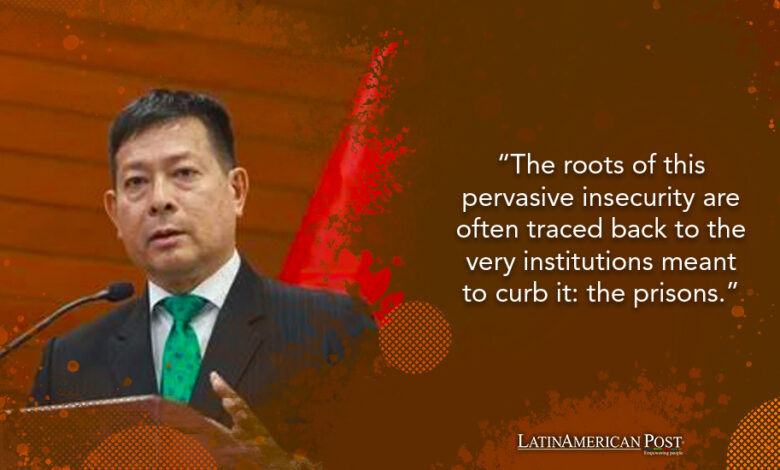Building Trust and Safety and The Urgent Need for Penitentiary Reform in Latin America

As Latin American nations grapple with escalating crime rates, the visit of Peru’s Minister of Justice to El Salvador underscores a pivotal moment for the region to embrace comprehensive penitentiary reform and combat corruption for a safer future.
Prisons and Citizen Safety in Latin America
The recent visit of Peru’s Minister of Justice and Human Rights, Eduardo Arana, to El Salvador, at the invitation of President Nayib Bukele, highlights a critical juncture for Latin America. The focus of the visit on exchanging public security experiences and inspecting El Salvador’s penitentiary system signals a growing recognition of the link between effective prison management and overall citizen safety. Yet, this exploration also sheds light on a broader issue plaguing the region: the dire need for robust, corruption-free penitentiary systems as a cornerstone of societal security.
Latin America, a region characterized by its rich cultural heritage and vibrant societies, has long been shadowed by the specter of crime and violence. From Mexico’s drug cartels to Brazil’s favela gangs, the narrative is distressingly similar across the continent. The roots of this pervasive insecurity are often traced back to the very institutions meant to curb it: the prisons. They are overcrowded, underfunded, and rife with corruption; Latin American penitentiaries frequently serve not as facilities for rehabilitation but as headquarters for criminal enterprises.
Bukele’s Controversial Approach: A Glimpse into Reform Impact
The example set by El Salvador under Bukele’s controversial yet attention-grabbing “Plan Control Territorial” offers a glimpse into the potential impact of drastic penitentiary reforms. Bukele’s measures, which include severe crackdowns on gang activities and the implementation of high-tech surveillance within prisons, have sparked debate over human rights concerns but also demonstrated a tangible decline in violence and crime rates. Despite its criticisms, this approach underscores the importance of robust and corruption-resistant prison systems in restoring public trust and safety.
Peru’s interest in El Salvador’s strategies comes at a time when Latin American countries are desperately seeking solutions to the endemic problem of criminal violence. The Peruvian government’s denial of adopting a “Plan Bukele” model in favor of developing its strategy emphasizes a common thread: the recognition that penitentiary reform and enhanced security measures are critical components of the fight against crime.
However, the challenge extends beyond simply emulating El Salvador’s tactics. Latin America’s diverse political, cultural, and social landscapes require tailored approaches to reform. Key to these efforts is eradicating corruption within the justice system—a factor that significantly undermines the efficacy of any reform measures. Corruption facilitates the continuation of criminal activities within prison walls and erodes public confidence in governmental institutions.
Comprehensive Reform: A Necessity for a Secure Future
For Latin America to achieve a more secure future, countries must commit to comprehensive penitentiary reform that includes increasing transparency, improving living conditions within prisons, offering genuine rehabilitation opportunities, and integrating technology for better management and oversight. Moreover, fostering interinstitutional coordination and embracing international cooperation can provide the support needed to implement these reforms effectively.
The path to reform is fraught with challenges, from political will and resource allocation to societal resistance and the protection of human rights. Yet, the alternative—a continuation of the cycle of violence and fear—threatens the region’s stability and prosperity.
Also read: Urgent Reform Needed: Enhancing Mine Safety in Latin America After Venezuela Traged
As Latin America stands at this crossroads, the actions of countries like Peru and El Salvador could set the tone for the continent’s future. Embracing penitentiary reform and combating corruption are not just policy choices but moral imperatives to safeguard millions’ rights, freedoms, and lives. In doing so, Latin America can forge a new narrative where safety and justice prevail, and the fear that has long overshadowed the region is finally lifted.





